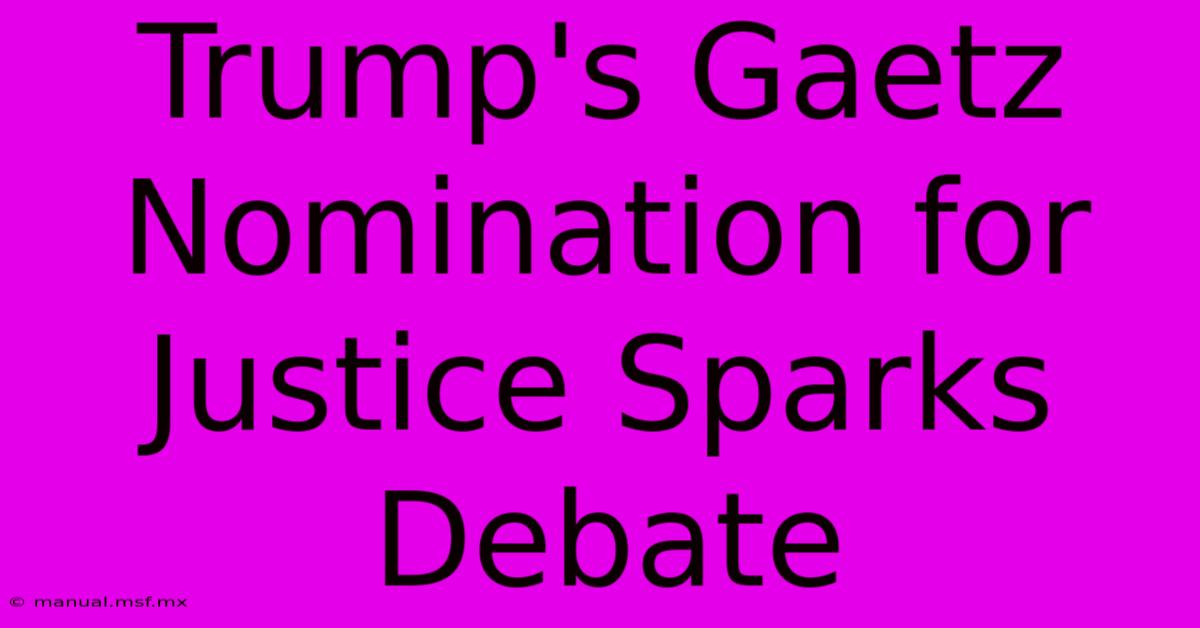Trump's Gaetz Nomination For Justice Sparks Debate

Discover more detailed and exciting information on our website. Click the link below to start your adventure: Visit Best Website. Don't miss out!
Table of Contents
Trump's Gaetz Nomination for Justice Sparks Debate: A Deep Dive into Controversy and Implications
Can a Congressman Accused of Serious Wrongdoing Be Nominated to the Highest Court? The recent nomination of Representative Matt Gaetz, a prominent Republican, to the Supreme Court by former President Trump has ignited a firestorm of controversy. This unprecedented move has thrust the nation into a heated debate about the qualifications, character, and potential conflicts of interest of a potential Justice.
Editor Note: The nomination of Matt Gaetz to the Supreme Court has been met with both fierce opposition and passionate support. This article delves into the complex issues surrounding this contentious appointment.
Understanding this controversy is crucial because it raises fundamental questions about the integrity of the judicial system, the role of political influence in judicial nominations, and the very nature of justice itself. It compels us to examine the balance between political affiliation and the principles of impartiality and fairness that are essential to the foundation of our legal system.
Our Analysis: We have meticulously analyzed legal opinions, political statements, and public discourse surrounding the Gaetz nomination. We have consulted with constitutional law experts, political scientists, and legal scholars to provide a comprehensive and unbiased assessment of this complex issue.
Key Takeaways of the Gaetz Nomination:
| Key Aspect | Description |
|---|---|
| Allegations of Wrongdoing | Gaetz faces serious allegations of corruption, including accusations of sex trafficking and campaign finance violations. |
| Political Motivations | The nomination is seen by some as a political maneuver, potentially aimed at solidifying conservative control of the Supreme Court. |
| Potential Conflicts of Interest | Gaetz's close ties to the former president and his history of controversial statements raise questions about his impartiality as a judge. |
| Public Opinion | Public opinion is deeply divided, with strong opposition from Democrats and some Republicans, but also vocal support from Gaetz's allies. |
| Constitutional Implications | The nomination raises fundamental questions about the qualifications and ethical standards required for a Supreme Court Justice. |
The Nomination's Impact:
This nomination has far-reaching implications, potentially impacting:
- Public Trust in the Judicial System: The appointment of a figure accused of serious wrongdoing could erode public trust in the Supreme Court's impartiality and legitimacy.
- Future Judicial Appointments: This nomination sets a precedent that could influence future appointments, potentially lowering the standards for judicial qualifications.
- Political Polarization: The heated debate surrounding this nomination could further divide the nation along political lines, exacerbating existing tensions.
- The Interpretation of Law: Gaetz's conservative ideology and his potential influence on the Court could have significant implications for the interpretation of key legal issues, including abortion, gun control, and voting rights.
Allegations of Wrongdoing
The accusations against Gaetz are serious and have been widely publicized. They include allegations of sexual misconduct, involving underage girls, and potential violations of campaign finance laws. Gaetz denies all allegations, and no formal charges have been filed.
The Potential for Conflicts of Interest
Gaetz's close political alliance with former President Trump has raised concerns about potential conflicts of interest. Critics argue that Gaetz's past statements and actions, including his vocal support for Trump and his controversial legislative record, suggest a bias that could compromise his impartiality as a Supreme Court Justice.
Public Opinion and Political Reactions:
The Gaetz nomination has been met with strong opposition from Democrats and a significant number of Republicans, who view it as a reckless and inappropriate move. However, Gaetz has also received support from a vocal minority of Republicans who view him as a strong conservative voice and a loyal ally of the former president.
Challenges and Considerations:
The nomination's approval process will face significant challenges, with legal experts and political analysts questioning Gaetz's qualifications and his ability to maintain the necessary impartiality for a Supreme Court Justice. The Senate Judiciary Committee will likely hold extensive hearings to scrutinize Gaetz's record, the allegations against him, and his potential conflicts of interest.
Conclusion:
The nomination of Matt Gaetz to the Supreme Court represents a pivotal moment in American jurisprudence and politics. The controversy surrounding this appointment highlights the critical importance of ethical conduct, judicial independence, and the public's trust in the legal system. The Senate's decision on this nomination will have far-reaching implications for the Court's future, the interpretation of law, and the nation's political landscape.

Thank you for visiting our website wich cover about Trump's Gaetz Nomination For Justice Sparks Debate. We hope the information provided has been useful to you. Feel free to contact us if you have any questions or need further assistance. See you next time and dont miss to bookmark.
Also read the following articles
| Article Title | Date |
|---|---|
| Cava Stock Gains After Q3 Earnings Report | Nov 14, 2024 |
| Dogecoin Market Cap Bigger Than Ford And Delta | Nov 14, 2024 |
| Match Coree Du Nord Iran Chaine Et Streaming | Nov 14, 2024 |
| Gaetz Resigns Trump Attorney General Role | Nov 14, 2024 |
| Laenderspielpause Testspiel Gegen Eintracht Braunschweig | Nov 14, 2024 |
| Cvb 52 En Marmara Spikeligue | Nov 14, 2024 |
| Ceo Detained Resolute Mining Shares Plummet | Nov 14, 2024 |
| Naifi Held Mit Schwerem Schicksal | Nov 14, 2024 |
| Coulier Announces Cancer Diagnosis | Nov 14, 2024 |
| World Diabetes Day 2024 Foot Health Check | Nov 14, 2024 |
